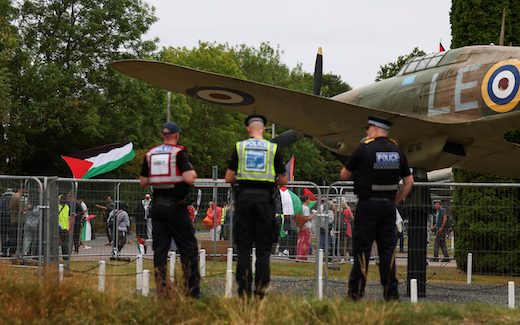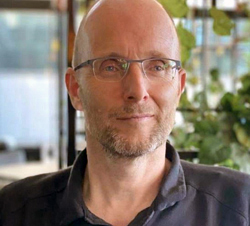 The government and police appear keen to expand the ‘hostile environment’ policy for immigrants to encompass the British public – and deter political dissent on Israel’s genocide
The government and police appear keen to expand the ‘hostile environment’ policy for immigrants to encompass the British public – and deter political dissent on Israel’s genocide
Many thanks to everyone who responded to my recent social media post on my being stopped by Thames Valley police this week in irregular circumstances and in an equally irregular manner.
From those responses, I have been able to come up with the most plausible explanation for why police pulled me over at around midday on Monday August 18 at the so-called Magic Roundabout intersection in High Wycombe.
1. Two days earlier, on Saturday, there had been a protest outside RAF Air Command, close to High Wycombe, against Britain’s documented and continuing air support for Israel’s genocide, which includes British spy flights over Gaza. Presumably, Thames Valley police have been on high alert ever since for possible pro-Palestinian activism that might target the RAF base in their area, just as RAF Brize Norton was targeted in June by the direct-action group Palestine Action.
The break-in at Brize Norton, in which protesters sprayed red paint on two military aircraft, was highly embarrassing to the armed forces and the government, both because it showed that security at the base was extremely lax and because it highlighted active British military collusion in Israel’s genocide.
The incident was so embarrassing, in fact, that the British government took unprecedented steps to redefine what constitutes “terrorism” – even against expert advice – so that Palestine Action could be proscribed. It is probably reasonable to assume that the police and government are taking extraordinary measures to make sure there is no repeat of such a break-in.
2. As I noted in my original post, everything about my encounter with the police seemed “off”. The officer insisted I pull over at a dangerous intersection, then cheerily asked how my day was going. He asked me if I was Jonathan Cook – the name my car is registered in – rather than, as would be normal, asking me who I was. He justified stopping me on the grounds of a general check because I was far from Bristol, the address where my car is registered – or for what he initially termed “cross-border activity”. After I said I was visiting family, he made no further inquiries, or indicated I had done anything wrong. He then waved me off in an equally cheery manner.
A few people seemed to think this might be related to checks on drug-running – or what is sometimes termed “county lines” policing. None of that explains the police behaviour on this occasion. The car has been registered in my name for four years. I have no criminal convictions. This was the middle of the day. Only I was stopped. And why name me to my face, if there is a suspicion of illegal activity, and not ask to see any documents or search the car?
Far more likely, it seems to me, is that a police number-plate check flagged either me or the car on political grounds. Either possibility should be deeply troubling about the state of our civil and legal rights at the hands of a police force and government that seem increasingly determined to expand a “hostile environment” policy for foreigners and immigrants to encompass the British public and deter political dissent.
Here are the two possibilities I can think of:
Scenario one: My name, as the registered car owner, was flagged as a “Palestine activist”, even though I am actually a journalist who writes about the Middle East from a perspective critical of government policy. Given that I was driving near RAF High Wycombe during a period of heightened alert, the police decided to pull my car over and check what I was up to. If that is the case, it is further evidence that the police are widely profiling Palestine solidarity activists and critical journalists, targeting them for “special treatment” that could include limiting their freedom of movement and harassing them with stop-and-search powers long used against ethnic-minority communities.
Scenario two: The number-plate check showed that the car was registered to an address in Bristol. Because Palestinian solidarity activism there has been especially prominent in opposition to Britain’s collusion in the Gaza genocide – including the recently proscribed group Palestine Action targeting an Israeli arms factory in Bristol owned by Elbit – the police decided to pull me over because of the car’s connection to the city. If that is the case, the police are carrying out regional-based profiling of political activism, and could similarly use it to develop easily abused stop-and-search powers.
I think the first scenario is far more likely, given that the officer named me, that the second option would be unwieldy to implement and arouse more opposition, and that many of those arrested over the attack on the Elbit factory in Bristol were from other parts of the country. But both scenarios are deeply concerning. They are about intimidation and harassment.
They also provide further evidence that Justice Chamberlain, the High Court judge currently hearing an appeal against Palestine Action’s proscription, was wrong in assuming that the police would use their new powers only to narrowly target those who specifically identify with the group and not turn those powers against the wider Palestine solidarity movement.
My case suggests that even journalists who are highlighting British collusion in crimes in Gaza are likely to be targeted by police. That fits with the wider persecution of journalists, as well as anti-genocide activists, under Britain’s draconian terrorism laws: such as Richard Medhurst, Craig Murray, Sarah Wilkinson and Asa Winstanley. They have suffered raids on their homes or been detained at border crossings simply for taking positions critical of Israeli and British crimes in Gaza.
Now the warning signs are that simply driving while opposing genocide may be enough to get you stopped by the police.









